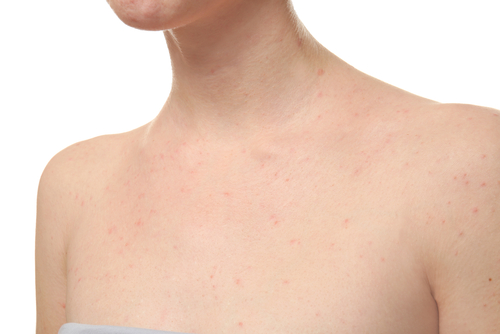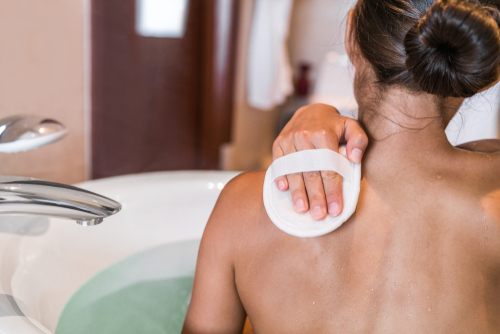When it comes to acne, most attention is directed at the face. However, acne is also frequently found on the chest, back, and shoulders, where it is known as truncal acne.
In fact, studies have shown that more than half of those with facial acne also have acne in these other anatomic locations. 25% of patients in these studies admit that they do not mention this torso acne to their skin specialist, but 78% would like to have these areas treated.
Why don't they tell their doctor about this problem if they want it treated? Some people in these studies mentioned embarrassment, while others regarded their face as their primary target of concern.
Truncal acne is slightly more common in males than females, and, contrary to popular belief, this type of acne is not restricted to the teenage years. 48% of adult women with facial acne also have had acne breakouts on their chest, back, and shoulders.
In addition, scarring and discoloration is more common on the chest and back. As the acne becomes more severe, the scarring can actually increase.
Fortunately, just like any other type of acne, there are treatments available for truncal acne. However, compared to treating facial acne, truncal acne treatments are admittedly more of a challenge.
 The chest and back are obviously a larger skin surface area to treat than the face. Plus, these areas are also difficult for an individual to reach when applying topical treatments to the areas alone. Thicker skin in these areas also makes scarring more of a long-term problem.
The chest and back are obviously a larger skin surface area to treat than the face. Plus, these areas are also difficult for an individual to reach when applying topical treatments to the areas alone. Thicker skin in these areas also makes scarring more of a long-term problem.
As with the face, good skin care under the direction of a skin care professional is very important in the treatment of truncal acne. Applying a gentle cleanser on the chest and back once to twice daily will help to remove the dirt and oil that accumulates on the skin and plugs up the pores.
If you find yourself using a cleanser, do not be overly aggressive while cleansing. You should also avoid scrubbing the broken-out areas.
After cleaning, a moisturizer should be used to combat the excessive drying that removing the oils can cause. Whatever moisturizer you use, make sure the fine print on the product specifies that the formula inside is non-comedogenic and/or non-acnegenic.
The next step for persistent breakouts on the chest and back is to use topical agents. We usually recommend benzoyl peroxide, which is a potent therapy to reduce bacteria on the surface of the skin.
 Use of this agent can reduce the need for oral antibiotics and the risk of antibiotic resistance. In addition, benzoyl peroxide is relatively easy to use over the large area of skin.
Use of this agent can reduce the need for oral antibiotics and the risk of antibiotic resistance. In addition, benzoyl peroxide is relatively easy to use over the large area of skin.
One downside is that because it is a peroxide, it can bleach clothing, towels, and/or bedding when it comes in contact with it. When benzoyl peroxide in on your skin, make absolutely sure it is completely absorbed before drying off or applying any type of fabric to your skin.
Depending on the severity of the acne, more advanced treatments can be discussed at the time of a consultation. At Maine Laser Skin Care, we have had a great deal of success with the use of Laser Genesis on areas of active acne both on the face and the upper body with high degrees of reducing active breakouts.
If scars on the upper body are hyperpigmented, whether darker or more red, the more superficial wavelengths of our lasers can lighten the discoloration of the scars. When these scars are lighter in color, the tone of the skin looks more consistent.
Deeper scars including "ice pick" scars can be reduced and softened with the use of radiofrequency micro needling (Secret RF). This technique helps to break up the existing scars and stimulate the body to produce more collagen under the surface, thereby lifting and smoothing the skin's more visible layers.
If you or someone you love has truncal acne about which they are embarrassed, there is hope for both active ongoing breakouts as well as the after effects and consequences of scarring. Now that our offices are open again as the pandemic is gradually subsiding, we would be glad to evaluate this or other skin issues you may have.
Simply call us in Scarborough at (207) 303-0125, or in Augusta at (207) 873-2158. If you call later while our offices are closed, our staff will get back to you the next business day. Thank you, and please continue to stay safe.

